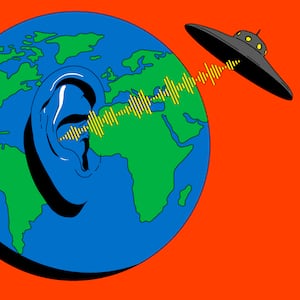In the movies, first contact between humans and aliens usually ends in war—between the humans and aliens. But in the real world, first contact is way more likely to end in war between humans and humans.
That was the conclusion of a groundbreaking study published two years ago, which helped launch an intensifying debate between two scientific camps. The first camp is pessimistic, and worries that first contact could have dire political consequences on Earth. The other, more optimistic group insists humanity could meet aliens for the first time and not go crazy over it.
It’s not a purely theoretical debate. There’s a practical—and potentially very serious—purpose behind the academic back-and-forth: to begin preparing politicians for the possibility of first contact, and try to get them to handle it like grown-ups.
“We need to really make sure those of us in the field are prepared for success, and that policymakers and government officials understand how [the search for extraterrestrial intelligence] works and what has really been found,” Jason Wright, a Penn State astronomer, told The Daily Beast.
Part of the urgency is fueled by the fact that there’s a growing consensus in the scientific community that aliens are out there, somewhere, and first contact will happen, eventually.
It’s basic math. There are a hundred thousand million stars in just our galaxy. And potentially hundreds of thousands of millions of planets. In our solar system alone there are several planets and moons besides Earth that have water and could, in theory, support life. We’ve already discovered thousands of exoplanets in the Milky Way, many of which show early signs that they could potentially support life. With better instruments, we’re poised to find thousands upon thousands of more new worlds in our galaxy—the odds that at least one is home to intelligent life is no longer so far-fetched.
These days, it’s not controversial for a scientist to believe in aliens. But believing first contact is imminent is still a fringe position. The universe is unfathomably vast. Our probes can reach only so far. Our radio receivers can only listen to a few nearby star systems.
Even if we directly observed evidence of alien life—extant or extinct, microbial or sentient—we might not recognize the evidence for what it is. Indeed, there are several scientists who credibly believe we’ve already observed aliens, but most are highly skeptical of such claims.
All that is to say, more and more scientists think it’s time to think through the political implications of first contact. “In the event of contact, things will likely move very quickly, and we may not have the time to carefully vet our reasoning,” Chelsea Haramia, a philosopher at Spring Hill College in Alabama, told The Daily Beast. “It's better to do what we can now—and to recognize what we can't do—with the knowledge that we have.”
When Kenneth Wisian and John Traphagan, respectively geophysicist and religious-studies experts at the University of Texas, studied the issue back in 2020, they came away more than a little worried.
Their main concern was that whichever country first makes contact with intelligent aliens—by way of a probe or radio broadcast or some other means—might suddenly become the most powerful country ever. Even if it wasn’t very powerful before first contact.
Knowledge of alien technology, “if wielded solely by one nation here on Earth, might enable it to dominate the world,” Wisian and Traphagan wrote in their peer-reviewed study, published in the journal Space Policy. “Controlling communication with an [extraterrestrial intelligence] could be the biggest ‘prize’ ever in international competition.”
And that prize could spark war, as the countries that didn’t contact aliens scramble to find out where E.T. is and how they might start up their own interplanetary conservations. If the country that made contact doesn’t voluntarily share the information, its rivals might try to force it out of them. “To think anything else is to be rather naive,” Traphagan told The Daily Beast.
It was an alarming assertion. But not every scientist on the E.T. beat agreed with it. A team led by Wright rebutted Wisian and Taphagan in a peer-reviewed study that appeared online on Sept. 29 and is also set for publication in Space Policy. Their main point is that the most likely method of contacting aliens is also the easiest and cheapest: radio.
Almost any country with satellite T.V. could use the same basic tech to listen to, and talk back to, aliens. “There are an enormous number of radio dishes designed to communicate with Earth satellites that could easily be repurposed for such an effort,” wrote Wright and his coauthors, including Haramia and NASA policy advisor Gabriel Swiney.
In a first-contact scenario involving an alien radio signal, there’s no easy way for any one country to monopolize contact with E.T., Wright’s team argued. And even if it were possible, there’s not that much the country that made first contact could learn from the aliens that would disrupt the world order, Wright and company added.
After all, we’ve already got nuclear weapons. And nukes trump everything. “Strategic nuclear weapons already present destructive force far beyond what is practical for war,” Wright and his coauthors wrote. “Even more advanced weapons would be unlikely to destabilize the international system; a country possessing some alien weapons system would still be subject to nuclear deterrence.”
Wisian and Traphagan took issue with some of Wright’s team’s assertions. If an alien radio signal is weak, it might take a very big and very expensive radio receiver to pick it up. “The facility needed would be on the order of a major radio telescope,” Wisian told The Daily Beast. “These are limited in number, are not quick to build and are fixed locations.”
In the case of a faint alien signal, a richer country perhaps could monopolize first contact—at least temporarily. Again, that could mean war.
But Wright for one cautioned against assuming first contact would play out in predictable ways. If and when it happens, it’ll be unprecedented. The politics might defy expectations. “One concern is that we’ll reach for historical analogies or highly dramatized science fiction tropes that are actually totally inappropriate,” he told The Daily Beast.
And in any event, both camps—Wisian’s and Wright’s—said they agree on the best solution to even the most dire first-contact scenario. Looking ahead to the possible day when aliens talk to us, we should start talking to each other.
“Perhaps the most effective way to forestall our scenario is the formal and informal scientist information-sharing,” Wright said. “Protocols for instant sharing and storage of incoming data would ensure that at least detection, but not the ongoing messaging, would be widely known.”
After all, if every country has access to all the potential alien signals, no one can go to war over them.









